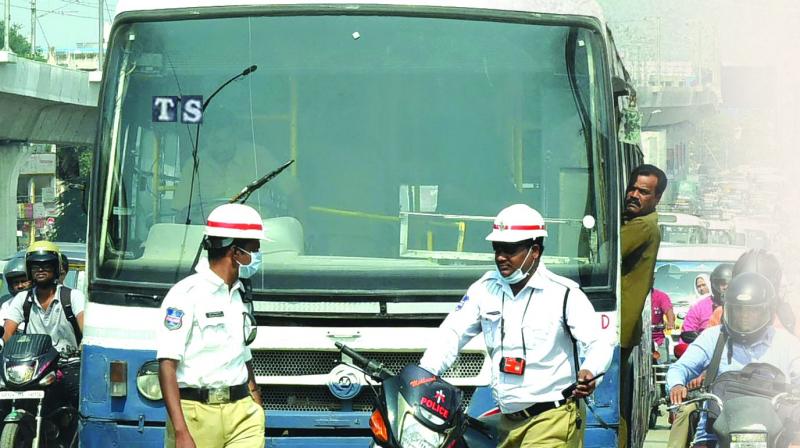Breakdowns plague TSRTC buses

Hyderabad: An urgent review is required of the fitness state of TSRTC buses that are plying on the city roads. On Thursday last week, there were four bus breakdowns at Abids, Khairatabad, Taj Krishna Junction and Banjara Hills resulting in utter chaos and traffic jams on the busy roads. On Friday, another RTC bus (AP11Z7364) broke down on Road No. 14, Banjara Hills. According to the traffic cops, on an average two to four RTC buses break down in the twin cities every day and sometimes the count reaches to seven or eight.
As many as 208 RTC buses have broken down on the city roads till June 19 from the beginning of the year. The maximum number of breakdowns was reported in Punjagutta, Sultan Bazaar, Saifabad and Begumpet. This regular occurrence is inconveniencing commuters on the road as with every breakdown they have to deal with long serpentine jams that take hours to ease up. Statistics regarding bus breakdowns are quite alarming. For the past six years till June 19, there were 5,292 breakdowns in the twin cities. Of these, 733 occurred last year.
The maximum number of breakdowns were registered in areas like Punjagutta, Begumpet, Sultan Bazaar, Saifabad, Chikkadpally, Abids, Kacheguda, SR Nagar and Mahankali. As many as 636 breakdowns were recorded in Punjaguta in the past six years which is the highest among all the areas whereas Saifabad had 486 breakdowns and SR Nagar had 389.
So, what causes sudden bus failures? Brake failure, tyre puncture, air-locking, failure of transmission system and engines are some of the main reasons of bus breakdowns according to the RTC officials. Lack of enough space to accommodate more buses at the bus depot for better maintenance and repair add to the woes.
A senior traffic official from Hyderabad traffic police said, “Frequent bus failures in the city and mainly on Punjagutta flyover and Greenlands flyover create a lot of traffic jams in the city. Commuters state that TSRTC should deploy better buses in the city to avoid traffic jams. Punjagutta, Saifabad and Begumpet make for the heartland of the city and these are the areas where frequent breakdowns of buses are being registered, especially on the flyovers. Commuters feel that TSRTC should also ensure that only fit buses which are in good condition should get on these flyovers to avoid maximum breakdown of buses.”
Mr Sohail Nayyar, a commuter from SR Nagar, said, “The TSRTC has to seriously figure out what the issue is. Old vehicles should be phased out. I had a board meeting which I could not attend, thanks to the traffic jam that I was stuck in for over an hour. With so much of chaos and everyone in a tearing rush but not able to move an inch, tempers were flying. I got into office late and in a foul mood. I’m sure so did many others.” Mr Naresh Kumar, a student, said, “I travel from Masab Tank to Ameerpet daily to attend my classes but due to frequent breakdowns of buses, I have to inevitably change the bus once or twice midway. There is an urgent need to replace or at least maintain these old RTC buses.”
TSRTC buses to get new radial tyres:
With frequent breakdowns of buses due to tyre issues, the RTC plans to fit radial tyres on all buses. Right now, 30 per cent of the buses run on radial tyres. The TSRTC says it is following preventive measures like periodical maintenance with exclusive mechanics in three different schedules. A chief mechanical engineer with the RTC said, “We are taking preventive measures to avoid breakdowns. As we don't have sufficient space for bus depots, it has become difficult to maintain these buses on a regular basis. A regular depot has space for 80 to 90 buses due to which the maintenance work for all the buses at the same time has become difficult.”
He said, “As most breakdowns are caused by tyre puncture, all the buses are now getting radial tyres which are more sensitive in responding to bad maintenance practices. To avoid failure of transmission system and engines, we take precautionary measures.” He said RTC was providing periodical maintenance of transmission systems and engines Schedule-1. In this, a mechanic is deployed to check engine oil, nuts and bolts, cleanliness and coolant daily.
In Schedule-II which happens once a week, greasing, tyre-alignment, electrical fuse and wires and air-cleaners are checked by mechanics. “Any major maintenance work is undertaken in Schedule-III where vehicles are checked by senior mechanics,” he said. TSRTC officials claim that breakdowns in the city have reduced over the last few years.

